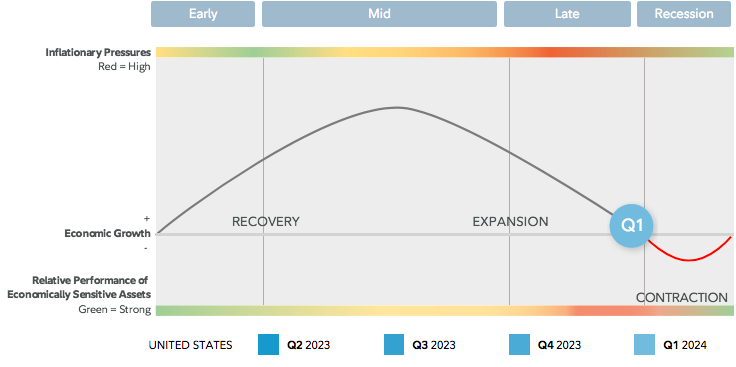Timing Is Everything
What’s the best way to survive a financial crisis with your wealth intact? The answer may surprise you.
Many investors would say, “Sell everything, and wait until it’s over!” That’s almost never good advice.
In the first place, some assets perform well in crises, and you should hold onto those. Secondly, how do you know a crisis has actually started?
What seems like a crisis may just be a short-term bump in the road. And finally, how do you know when it’s over? There were numerous 20% stock rallies during the Great Depression even as stocks were grinding lower over a three-year crash.
I’ll tackle these specifics below, but I should point to an important aspect first: In any financial or market condition there are winners and losers. Diversification and timing are the keys to emerging as a winner.
The point is that you can make huge investment gains in recessions if you see the recession coming and make the right moves at the right time.
And not every stock falls in a recession or even a market crash. During the Great Depression, the best performing stock on the New York Stock Exchange was Homestake Mining. Even as stocks were falling 80%.
Homestake rallied because it was one of the largest gold mines in the world. The dollar price of gold rose 75% in 1933–1934 when Franklin Delano Roosevelt devalued the dollar from $20.67 per ounce of gold to $35.00 per ounce. Homestake produced gold and its stock price rose accordingly.
“Timing is everything” may be a cliche, but it’s true. Your approach to recession-related investing has to take into account the timing of the recession before, during and after.
This points to the key to recession-related investing. There are three distinct stages, and each stage has different profit dynamics. Stage 1 is the time period before the recession begins. This is your last chance to leave the theater before the fire starts.
Making Money in a Recession
The bottom line is there are opportunities to make money in recessions, but one must distinguish among the three stages and pursue different strategies in each stage.
Stage 1 is dominated by cash and Treasuries and dodging the recession bullet. Stage 2 is dominated by selective stock picking that spots the sectors that perform well in hard times. Stage 3 is bottom-fishing in stocks more broadly to prepare for the next rally. Gold has a role in all three stages.
Stage 1
During this stage, you should reduce equity exposure (while stocks are still near highs), increase your cash allocation (to weather the storm and reduce volatility) and increase your exposures to U.S. Treasury notes (that will rally in deflation without credit risk) and gold (your hedge against inflationary government remedies).
Setting up these trades is easy, but forecasting a recession is challenging. There are many reliable technical indicators that I cover including inverted yield curves, negative swap spreads, collateral shortages, tightening of credit standards by banks and reduced commercial lending.
These indicators are not typically covered by business media who tend to focus more on the unemployment rate (which is a lagging indicator) and the Federal Reserve, who are always the last to know.
It’s also frustrating to position yourself for a recession while the stock market is still rising and your friends and neighbors are bragging about their big gains. They won’t be bragging when the crash comes.
It’s precisely at this stage where patience is a virtue.
Stage 2
Stage 2 is when the recession has actually hit and you’re in the thick of it. If you made the right moves at Stage 1, then you’ll be doing fine. Your Treasury bonds will be rallying, your cash will be your dry powder for new investing at the lows and your reduced stock portfolio will not be wiping out your entire portfolio.
This is where careful stock picking comes in.
It’s entirely possible to make money in the stock market while the market as a whole is crashing. Holding index funds won’t help you, but active investing will. The key is to choose sectors that will do well even in a recessionary environment. I include defense stocks in this category.
In addition, new weapons systems including drones and AI-assisted robots will be in demand. The major players in the military-industrial complex as well as some new players with the latest technology will do well.
Other sectors that can perform well even in a recession are the oil and natural gas industry, the agricultural sector and mining.
Stage 3
This brings us to Stage 3 of the recession, which is the bottom just as stocks are about to begin a new bull market. This is where you can use your cash reserves to pick up bargains in beaten-down sectors such as Big Tech, consumer durables, consumer electronics, travel and entertainment, financials, fashion, luxury goods and sports.
This is also a good time to lighten up on your U.S. Treasury securities, since interest rates tend to rise in a growing economy and that will cause losses in bond prices.
For consumers with jobs and cash, recessions can actually be good times because prices are lower (or at least not rising as much), more goods are available and there tends to be more capacity at travel destinations, restaurants, performing arts venues and other attractions.
Of course, the opposite is true. For those who lose jobs or deplete savings, a recession represents hard times where many luxury or discretionary purchases and activities fall by the wayside.
The UBS Global Investment Returns Yearbook, which analyzes financial markets since 1900, shows that an equity portfolio diversified across 21 countries is 40% less risky than investing in a single country. Similarly, a portfolio composed of 60/40 equities and bonds is generally less volatile than one composed solely of equities.
It is certainly only by diversifying asset classes, geographical zones and sectors of activity that investors can enrich themselves over the long term, while coping with transient market dynamics.
The key is to stay diversified and be nimble!






